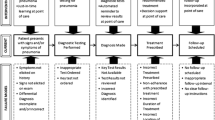Abstract
The Implementation Study of the Fort Bragg Evaluation documented how the Demonstration was executed and whether it met the expectations of the continuum of care philosophy upon which it was based. Based on the theory-driven and component approaches to program evaluation, a case study methodology was employed. First, the theories and assumptions about the Demonstration were explicated to derive a program model. Next, the program-as-implemented was compared to the program-as-planned. Barriers responsible for diluting full-scale implementation were documented. This study provides a comprehensive description of how the Demonstration was put into place and the evidence necessary to conclude that the Demonstration was executed with high fidelity, despite barriers, to provide an excellent test of the program theory.
Similar content being viewed by others

References
Hargreaves WA, Shumway M: Effectivenss of services for the severely mentally ill. In: Taube CA, Mechanic D (Eds.):The Future of Mental Health Services Research. ADM 89-1600. Washington, DC: U.S. Government Printing Office, 1989.
Rossi PH, Freeman HE:Evaluation: A Systematic Approach. Beverly Hills, CA: Sage, 1985.
Palumbo DJ, Oliverio A: Implementation theory and the theory-driven approach to validity.Evaluation and Program Planning 1989; 12:337–344.
Chen H:Theory-Driven Evaluations. Newbury Park, CA: Sage, 1990.
Bickman L (Ed.):Using Program Theory in Evaluation. San Francisco: Jossey-Bass, 1987.
Brekke JS, Test MA: A model for measuring the implementation of community support programs: Results from three sites.Community Mental Health Journal 1992; 28:227–247.
Scheirer MA, Rezmovic EL: Measuring the degree of program implementation: A methodological review.Evaluation Review 1983; 7:599–633.
Rezmovic EL: Assessing treatment implementation amid the slings and arrows of reality.Evaluation Review 1984; 8:187–204.
Bickman L: Improving established statewide programs.Evaluation Review 1985; 9:189–208.
Chen H, Rossi PH: The theory-driven approach to validity.Evaluation and Program Planning 1987; 10: 95–103.
Yin RK:Case Study Research. Beverly Hills CA: Sage, 1984.
Yin RK:Applications of Case Study Research. Newbury Park, CA: Sage, 1993.
Bolland JM, Wilson JV:The Madison County Youth Services Network: The Final Report of the United Way Needs Assessment Project. Tuscaloosa, AL: Institute for Social Science Research, University of Alabama 1991.
Marsden PV: Network data and measurement.Annual Review of Sociology 1990; 16:435–463.
Morrissey JP: An interorganizational network approach to evaluating children’s mental health service systems. In: Bickman L, Rog D (Eds.):Evaluating Mental Health Services for Children. San Francisco: Jossey-Bass, 1992, pp. 85–98.
Wasserman S, Faust K:Social Network Analysis: Methods and Applications, Cambridge: Cambridge University Press, 1994.
Conrad KJ, Miller TQ: Measuring and testing program philosophy. In: Bickman L (Ed.):Using Program Theory in Evaluation. San Francisco: Jossey-Bass, 1987, pp. 19–42.
Scheirer MA: Program theory and implementation theory: Implications for evaluators. In Bickman L (Ed.):Using Program Theory in Evaluation. San Francisco: Jossy-Bass, 1987, pp. 59–76.
Behar L: Changing patterns of state responsibility: A case study in North Carolina.Journal of Clinical Child Psychology 1985; 14:188–195.
Stroul BA, Friedman RM:A System of Care for Severely Emotionally Disturbed Youth. Washington, DC: CASSP Technical Assistance Center at Georgetown University, 1986.
Heflinger CA: Measuring service system coordination in managed mental health care for children and youth.Evaluation and Program Planning, in press.
Bickman L, Dokecki P: The for-profit delivery of mental health services.American Psychologist 1989; 44:1133–1137.
Kiesler CA, Simpkins CG:The Unnoticed Majority in Psychiatric Inpatient Care. New York: Plenum, 1993.
Behar L: The North Carolina Willie M. Program: One model for services to multiple handicapped children. In: Stark JA, Menolascino FJ, Albarelli MH, Gray VC (Eds.):Mental Retardation and Mental Health: Classification, Diagnosis, Treatment, Services. New York: Springer-Verlag, 1988, pp. 416–429.
Mazmanian DA, Sabatier PA:Implementation and Public Policy Glenview, IL: Scott, Foresman, 1983.
Author information
Authors and Affiliations
Additional information
This research was supported by the U.S. Army Health Services Command (DADA 10-89-C-0013) as a subcontract from the North Carolina Department of Human Resouces, Division of Mental Health, Developmental Disabilities, and Substance Abuse Services, and a grant to Dr. Leonard Bickman (R01MH-46136-01) from the National Institute of Mental Health. This article is part of a special issue that focuses on the Fort Bragg Evaluation. These articles are best understood when read together. The articles are cross-referenced when it is deemed most appropriate.
Rights and permissions
About this article
Cite this article
Anne Heflinger, C. Implementing a system of care: Findings from the Fort Bragg Evaluation Project. The Journal of Mental Health Administration 23, 16–29 (1996). https://doi.org/10.1007/BF02518640
Issue Date:
DOI: https://doi.org/10.1007/BF02518640



